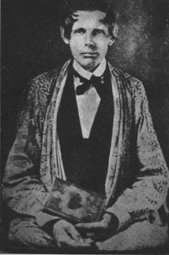
Samuel Worcester
The case Worester v Georgia gave the aging Chief Justice
John Marshall the opportunity closes the circle of his trilogy by
arguing/establishing a trust relationship between tribal
governments and the federal government. (see
John Marshall). In this case, the state of Georgia had
arrested Mr. Worester and eight other missionaries who regularly
met with Cherokee's in the town of New
Echota.

Despite the legal victory
in the nation's highest court, President Andrew Jackson and the
state of Georgia pressed ahead with their plan to forcibly remove
the Cherokee from their treaty-protected homelands in the states of
Georgia, Tennessee, and North Carolina.
The missionaries were charged with violating a new state law by
crossing the Indian boundaries without first getting permission
from the state. When offered clemency by the governor, seven
of the missionaries accepted, but Mr. Worester and Dr. Elizur
Butler chose to press their case, arguing that the state had
usurped federal powers and tribal sovereignty by imposing its new
laws. Worester's case, argued by the former U.S. Attorney
General William Wirt, won a unanimous decision from the court in a
powerful reaffirmation of Native American sovereignty.
The Marshall trilogy of Indian cases (Johnson v McIntosh,
Cherokee v Georgia, and Worester v Georgia) now formed the
backbone of the 'Indian trust doctrine' and federal Indian
policy.
click here for more
President Andrew Jackson and the state legislature of Georgia were
undaunted by their legal defeat. Both pressed ahead with
their plans to forcibly remove Indians from treaty lands in
southern states, commencing an officially sanctioned policy of
genocide and 'ethnic cleansing' that is now known as the Trail of
Tears.
Related People
Related Events
Related Flashpoints
Related Places